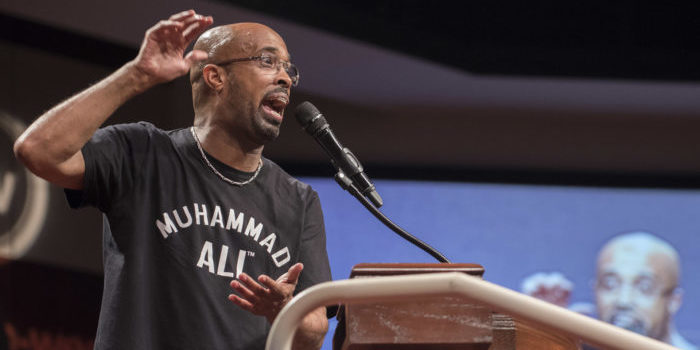(Headline USA) The activist group founded by the Rev. Jesse Jackson in the 1970s is elevating a new leader for the first time in more than 50 years, choosing a Dallas pastor as his successor to take over the Rainbow PUSH Coalition.
The Rev. Frederick D. Haynes III was formally installed as president and CEO in a ceremony Thursday in downtown Dallas, replacing Jackson, 82, who announced in July that he would step down.
Jackson, a firebrand—and often controversial—orator whose pragmatic ethos left an indelible mark on U.S. race relations in the decades following the civil-rights movement, has dealt with several health issues in recent years and has been diagnosed with Parkinson’s disease.
Haynes, 63, said he began working with Jackson on the transition in the fall.
“I’m appreciative of what he’s poured in to me, which makes me feel like I’ve been prepared for this experience and this moment,” he said.
“One of the things that we have shared with the staff is that we have been the beneficiary of the dynamism, the once-in-a-generation charisma of Rev. Jackson, and now what we want to do is institutionalize it, as it were, make the organization as dynamic and charismatic as Rev. Jackson,” Haynes said. “Whereas he did the work of 50 people, we need 50 people to do the kind of work that Rev. Jackson did.”
Haynes, who has been senior pastor at Friendship–West Baptist Church in Dallas for over 40 years, will remain in Dallas and continue in that role as he leads the Rainbow PUSH Coalition. He said his work at the justice-oriented church will serve as an expansion of the work done by the Rainbow PUSH Coalition, which will still be based in Chicago.
Jackson, a protégé of the Rev. Martin Luther King Jr., broke with the Southern Christian Leadership Conference in 1971 to form Operation PUSH, which initially stood for People United to Save Humanity. The organization was later renamed the Rainbow PUSH Coalition.
The group’s work ranges from promoting minority hiring in the corporate world to conducting voter registration drives in communities of color.
Before Barack Obama was elected president in 2008, Jackson had been the most successful black presidential candidate. He won 13 primaries and caucuses in his push for the 1988 Democratic nomination, which went to Massachusetts Gov. Michael Dukakis.
But Obama’s election proved to be a double-edged sword for Jackson. The ascendent president failed to show due deference to the fellow Chicagoan, instead distancing himself from Jackson’s divisive brand as he worked to assuage the lingering apprehensions of racist white liberals.
In a candid hot-mic moment during a Fox News interview, Jackson accused Obama of “talking down to black people” before murmuring to fellow guest Reed V. Tuckson of UnitedHealth, “I want to cut his nuts off.”
Jackson’s eldest son, Rep. Jesse Jackson Jr., who was the co-chair of Obama’s presidential campaign, rebuked his father, who would apologize for the comments, but found himself cast out of Obama’s inner-circle.
His son later was implicated in a “pay-to-play” scandal led by then-Gov. Rod Blagojevich to replace Obama in the Senate, which eventually went to former state Attorney General Roland Burris.
Jackson Jr. resigned his House seat in 2012 while facing allegations of fraud for misusing campaign funds, and later spent time in a federal prison.
Haynes said he first met Jackson when he was a college student in 1981. “He comes to campus as this larger-than-life, charismatic, dynamic figure, and immediately I was awestruck,” Haynes said.
He was inspired by Jackson’s runs for president in 1984 and 1988, and after the two connected in the 1990s, Jackson began inviting him to speak at Rainbow PUSH.
On Friday, Rainbow PUSH hosted a social justice conference at Paul Quinn College, a historically black college in Dallas. Jackson was expected to attend both the ceremony Thursday and the conference Friday.
“I’m just very excited about the future,” Haynes said. “I’m standing on some great shoulders.”
Adapted from reporting by the Associated Press

